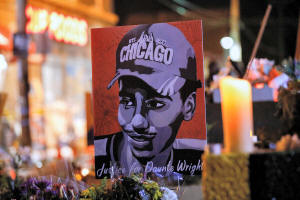Opening statements begin in trial of Minnesota police officer who killed
Daunte Wright
 Send a link to a friend
Send a link to a friend
 [December 08, 2021]
By Nathan Layne [December 08, 2021]
By Nathan Layne
(Reuters) - A white Minnesota police
officer who fatally shot an unarmed Black motorist in April, triggering
protests against police brutality, will go on trial on Wednesday as
opening statements to the jury get underway.
Kimberly Potter, a former police officer in a city north of Minneapolis,
has said she mistakenly used her handgun instead of her Taser when
firing at Daunte Wright, 20, as he attempted to flee in his car
following a traffic stop.
Potter, 49, has pleaded not guilty to first and second-degree
manslaughter charges, which carry maximum sentences of 15 and 10 years
respectively. Her lawyers have said she will testify in her own defense.
Prosecutors are expected to use their opening remarks to stress the
extensive training received by Potter, making her criminally culpable
for the mistake, legal experts said. Potter, a 26-year veteran of the
police force, had completed two Taser-specific training courses in the
six months prior to the incident, according to the criminal complaint.
"You have to get across that this whole thing is about accountability,"
said Joe Tamburino, a criminal defense attorney not involved in the
case, referring to the prosecution's strategy. "She is a highly trained
police officer."
Potter's attorneys, on the other hand, will likely argue that she made
an honest mistake under the intense pressure of the situation, and that
while Wright's death was tragic, he created the danger by resisting
arrest.

Jack Rice, a criminal defense attorney based in St. Paul, Minnesota,
said the continued surge in gun violence across major U.S. cities could
help the defense. Minneapolis is edging closer to a record number of
annual homicides in 2021.
"There is a perception that the only wall that is protecting society are
these people in blue," Rice said. "The defense is going to use that."
Caught on Potter's body-worn camera, the shooting of Wright triggered
several nights of demonstrations, with many calling the incident another
example of police violence against Black Americans and some demanding
Potter be charged with murder.
TRIAL WITNESSES
The shooting garnered particular attention in part because it occurred
just a few miles north of where Derek Chauvin, a white former
Minneapolis police officer, was standing trial in the case of George
Floyd, a Black man whose death during a May 2020 arrest set off
nationwide racial justice protests.
The Potter trial is being held in the same Hennepin County courtroom
where a jury in April convicted Chauvin of murder.
[to top of second column]
|

A poster of Daunte Wright is seen after the guilty verdict in the
Derek Chauvin trial was announced at George Floyd Square in
Minneapolis, Minnesota, U.S., April 20, 2021. REUTERS/Nicholas Pfosi

To prove first-degree manslaughter, prosecutors must show Potter
killed Wright while committing the misdemeanor offense of recklessly
handling a firearm. The second-degree charge requires that Potter be
found to have caused Wright's death through culpable negligence.
On Wednesday, legal experts said prosecutors would likely preview
the planned testimony of Seth Stoughton, a use-of-force expert and
professor at the University of South Carolina School of Law who also
testified for the state in the Chauvin trial.
In an October court filing, Paul Engh, one of Potter's attorneys,
argued Stoughton would promote a "false narrative" that the officers
should have allowed Wright to flee the scene. Rather, Engh wrote, it
was Wright who created a dangerous situation and a Taser was
necessary to stop him.
For the defense, the most important witnesses include Laurence
Miller, a forensic and police psychologist slated to testify about
how the brain can "slip" and choose an unintended but more common
action, and Potter herself.
Potter can be heard on her body camera video shouting "I'll tase
you," at Wright, who was struggling to get away from another
officer's grip. After shooting Wright, Potter said: "I grabbed the
wrong (expletive) gun".
Mike Brandt, a Minneapolis-area defense attorney, said he expected
Potter's lawyers to argue that the shooting was the result of a
split-second decision made under duress - an assertion her own
testimony would seek to drive home.
"If she comes across as likeable and sympathetic the jury could be
more likely to acquit," Brandt said.
(Reporting by Nathan Layne in Wilton, Connecticut; Editing by
Karishma Singh)
[© 2021 Thomson Reuters. All rights
reserved.] Copyright 2021 Reuters. All rights reserved. This material may not be published,
broadcast, rewritten or redistributed.
Thompson Reuters is solely responsible for this content.
 |